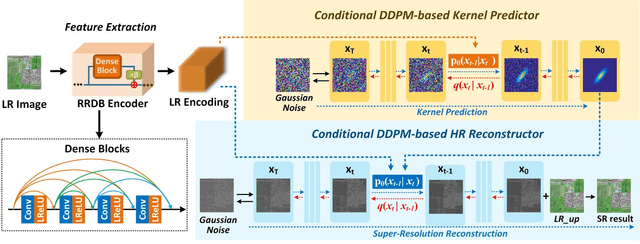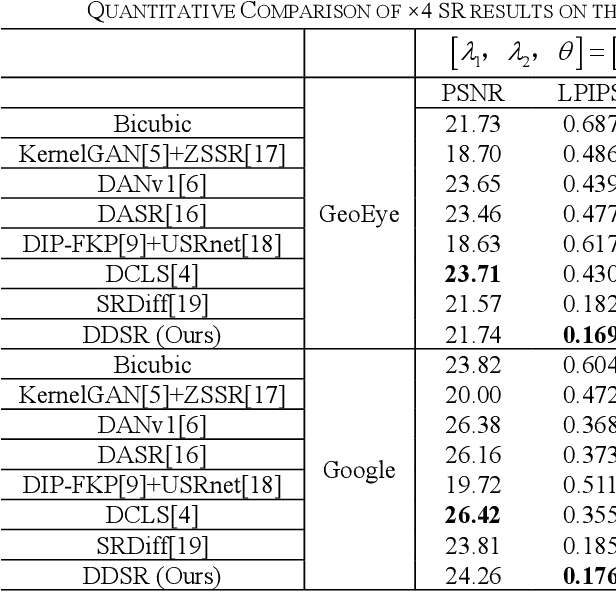Mengze Xu
Dual-Diffusion: Dual Conditional Denoising Diffusion Probabilistic Models for Blind Super-Resolution Reconstruction in RSIs
May 20, 2023



Abstract:Previous super-resolution reconstruction (SR) works are always designed on the assumption that the degradation operation is fixed, such as bicubic downsampling. However, as for remote sensing images, some unexpected factors can cause the blurred visual performance, like weather factors, orbit altitude, etc. Blind SR methods are proposed to deal with various degradations. There are two main challenges of blind SR in RSIs: 1) the accu-rate estimation of degradation kernels; 2) the realistic image generation in the ill-posed problem. To rise to the challenge, we propose a novel blind SR framework based on dual conditional denoising diffusion probabilistic models (DDSR). In our work, we introduce conditional denoising diffusion probabilistic models (DDPM) from two aspects: kernel estimation progress and re-construction progress, named as the dual-diffusion. As for kernel estimation progress, conditioned on low-resolution (LR) images, a new DDPM-based kernel predictor is constructed by studying the invertible mapping between the kernel distribution and the latent distribution. As for reconstruction progress, regarding the predicted degradation kernels and LR images as conditional information, we construct a DDPM-based reconstructor to learning the mapping from the LR images to HR images. Com-prehensive experiments show the priority of our proposal com-pared with SOTA blind SR methods. Source Code is available at https://github.com/Lincoln20030413/DDSR
Weakly-supervised ROI extraction method based on contrastive learning for remote sensing images
May 10, 2023Abstract:ROI extraction is an active but challenging task in remote sensing because of the complicated landform, the complex boundaries and the requirement of annotations. Weakly supervised learning (WSL) aims at learning a mapping from input image to pixel-wise prediction under image-wise labels, which can dramatically decrease the labor cost. However, due to the imprecision of labels, the accuracy and time consumption of WSL methods are relatively unsatisfactory. In this paper, we propose a two-step ROI extraction based on contractive learning. Firstly, we present to integrate multiscale Grad-CAM to obtain pseudo pixelwise annotations with well boundaries. Then, to reduce the compact of misjudgments in pseudo annotations, we construct a contrastive learning strategy to encourage the features inside ROI as close as possible and separate background features from foreground features. Comprehensive experiments demonstrate the superiority of our proposal. Code is available at https://github.com/HE-Lingfeng/ROI-Extraction
 Add to Chrome
Add to Chrome Add to Firefox
Add to Firefox Add to Edge
Add to Edge